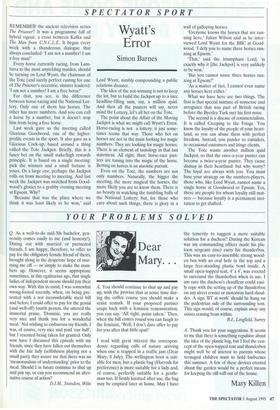SPECTATOR SPORT
Wyatt's Error
Simon Barnes
REMEMBER the ancient television series The Prisoner? It was a programme full of hybrid vigour, a cross between Kaflca and The Man from UN.C.L.E. It began every week with a thunderous dialogue that always concluded: 'I am not a number! I am a free man!'
Every horse currently racing, from Lam- tarra to the most unyielding maiden, should be turning on Lord Wyatt, the chairman of the Tote (and surely perfect casting for one of The Prisoner's eccentric, sinister leaders): 'I am not a number! I am a free horse!'
For that, you see, is the difference between horse-racing and the National Lot- tery. Only one of them has horses. The other has mere numbers. And you can call a horse by a number, but it doesn't stop him from being a free horse.
Last week gave us the meeting called Glorious Goodwood, one of the higher- profile events in the sport. It also gave us a Glorious Cock-up, based around a thing called the Tote Jackpot. Briefly, this is a fancy bet on the small stake/high rewards principle. It is based on a single meeting: pick the winners and a small fortune is yours. Or a large one, perhaps: the Jackpot rolls on from meeting to meeting. And last week the Jackpot was switched from Good- wood's glories to a grubby evening meeting at Epsom. Why?
'Because that was the place where we think it was least likely to be won,' said Lord Wyatt, nimbly compounding a public relations disaster.
The idea of the not-winning is not to keep the lot, but to build the Jackpot up to a nice headline-filling sum, say, a million quid. And then all the punters will say, never mind the Lottery, let's all bet on the Tote.
The point about the Affair of the Moving Jackpot is what we might call Wyatt's Error. Horse-racing is not a lottery; it just some- times seems that way. Those who bet on horses are not in the main looking for magic numbers. They are looking for magic horses. There is an element of tautology in that last statement. All right, then: horse-race pun- ters are tuning into the magic of the horse. Betting on horses is an atavistic pursuit.
Even on the Tote, the numbers are not only numbers. Naturally, the bigger the meeting, the more magical the horses, the more likely you are to know them. There is no beauty in watching the tumbling balls of the National Lottery; but, for those who care about such things, there is glory in a wall of galloping horses.
'Everyone knows the horses that are run- ning here,' Julian Wilson said as he inter- viewed Lord Wyatt for the BBC at Good- wood. 'I defy you to name three horses run- ning at Epsom.'
'That,' said the triumphant Lord, 'is exactly why it [the Jackpot] is very unlikely to be won.'
'But you cannot name three horses run- ning at Epsom?'
'As a matter of fact, I cannot even name any horses here either.'
What we have here are two things. The first is that special mixture of nonsense and arrogance that was part of British racing before the Byerley Turk met his first mare.
The second is a disease of commercialism. It is called Creeping to the Fringe. You know the loyalty of the people of your heart- land, so you can abuse them with perfect freedom. Instead, you pander to outsiders, to occasional customers and fringe clients.
The Tote wants another million quid Jackpot, so that the once-a-year punter can become a twice-a-year punter. They cause dismay in their heartland: but why worry? The loyal are always with you. You must base your strategy on the numbers-players, those who, like Lord Wyatt, cannot name a single horse at Goodwood or Epsom. Yes, there are people for whom loyalty still mat- ters — because loyalty is a permanent invi- tation to get shafted.


















































 Previous page
Previous page